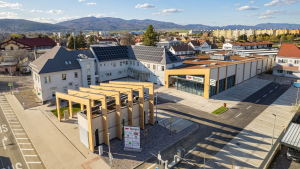
CBRE expects the COVID-19 outbreak to have a negative short-term impact on certain sectors of the commercial real estate market. However, the further transmission and evolution of the virus remains difficult to predict.
If COVID-19 spreads aggressively across the EMEA region, it will conceivably have a significant impact on economic growth and therefore CRE investment volumes. In addition, restrictions on travel and the movement of goods between the EMEA region and China will predominantly affect sectors relying on supply chains and tourism. In regards to the investment market, pressure on the European Central Bank (ECB) for a continued accommodative approach to monetary policy suggests a continued low-yield environment. Nevertheless, if the impact of COVID-19 resembles that of the SARS outbreak in 2003, a strong rebound in investment could occur during the second half of the year (albeit we recognise we are much longer in this economic cycle).
Investment
Travel restrictions are already resulting in the cancellation of face-to-face meetings, site visits and trade shows in EMEA. This could impact the real estate investment market, with a reduction of inflows from Asia Pacific-based investors possible. As the first quarter is typically a slow period for the investment market, the impact on full-year volumes may be somewhat limited. To put this into context, over the last 14 years, the first quarter accounted for 20% of total annual investment per year, compared to the fourth quarter’s 30% (with the risk of stifled economic growth, central banks are likely to keep rates low in this environment. This may help liquidity create new investment opportunities). Moreover, given that the investment market moves slowly in terms of transactions, any effect on investment may not be observable immediately.
Office
The impact on the office market has been limited thus far. However, supply chain and logistics issues arising from a disruption in manufacturing and transport could hamper the construction pipeline and affect renovation projects. Recent stock market corrections may trigger companies to adopt a more cautious approach to expansion in the short-term.
Retail
High street retail in major European cities is heavily reliant upon tourism. Therefore, a reduction of travel and fewer tourists could weigh on the sale of luxury goods and consumer staples in cities such as Milan. If COVID-19 spreads across Europe more aggressively than initially expected, local residents’ fear of exposure in public places could also disrupt domestic retail consumption. This disruption would further accentuate the already existing pressure on brick-and-mortar retail caused by the rapid growth of e-commerce.
Hotels
In the short-term, CBRE expects a decline in Chinese arrivals to Europe resulting from measures to contain COVID-19. However, the overall impact of this will be limited, given that China currently only accounts for 2% of total European international arrivals.4 Regarding intra-regional European travel, in the short-term we expect corporate and MICE (meetings, incentives, conference and events) demand to be most vulnerable to the COVID-19 outbreak as organisations adopt a cautious stance on non-essential business-related travel. CBRE also expects leisure travel demand to generally remain stable in the immediate term, ensuring domestic travel markets stay relatively robust. However, this will depend on individuals’ perception of risk, government measures and the ability of consumers to recover any possible losses from travel insurance providers.
Industrial & logistics
Transportation restrictions pose a significant challenge for the supply chain and logistics industries. Any obstruction in the transfer of raw materials and intermediate goods may affect import and export-dependent markets, notably German manufacturing. Given that these operations require extensive capital to function, the displacement or closure of factories could have long term implications. On the other hand, market destabilisation may incentivise regional investment in the sector as a means of risk aversion. In addition, while e-retailers may benefit from increased demand in the short-term, these platforms may face some pressure from a disrupted supply chain.
Operational real estate
The short-term economic perspectives in operational real estate sectors remain favourable. Although trends indicate more international investment in alternatives such as student housing and data centres, the majority of capital remains domestic. International travel restrictions will have a negligible influence on demand as European citizens comprise almost the entirety of targeted consumers. However, a change in market dynamics stemming from the global economic impact of COVID-19 may still ripple through these industries. Quarantine regulations – both self- and government-imposed – could affect certain sectors, particularly healthcare.
Conclusion
The impacts of a dip in China’s Q1 2020 GDP growth will be felt most acutely in European countries that rely on China as a source of final demand (Germany and Netherlands) and markets where China is highly integrated into the supply chain (Germany, Poland, France, Italy and Spain).
CBRE’s base case is that China’s stimulus and efforts to contain the virus over the next coming months will successfully act to mitigate the downside risks to the supply chain. While the EA outlook is now conditional on both containment in China and in Europe itself, CBRE’s view at this stage is that effects on full-year EA economic growth are minimal, despite increased short-term downside risks.
European property market fundamentals remain strong. While the COVID-19 outbreak will have a negative short-term impact on certain sectors, CBRE expects the impact on European commercial real estate to be minimal in the long-term.



